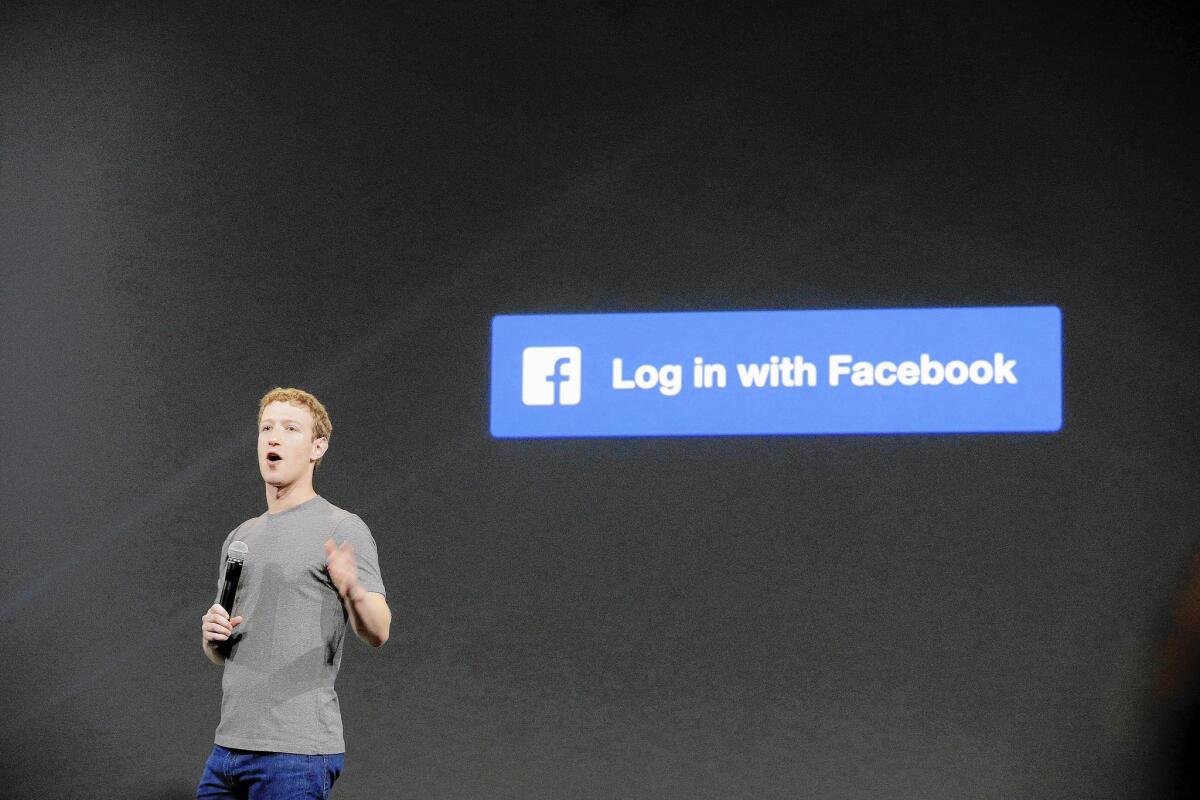Facebook makes it easier for users to share less

- Share via
Has Mark Zuckerberg had a change of heart?
For years, the Facebook chief executive pushed users to share more and more, much to the ire of privacy advocates.
But on Thursday, the company announced that it will make it easier for users to share less, changing the default sharing setting for new users to friends only, instead of public, and make it easier for its 1.28 billion existing users to monitor and change their privacy settings.
The announcement comes just weeks after Zuckerberg signaled that Facebook would enable users to interact anonymously with third-party apps.
The shifts, observers said, might have less to do with a change in his personal philosophy and more to do with an attempt to keep his user base strong, fend off competitors and preempt government regulators.
“They’ve realized that if they want to continue to be successful, they have to focus on the user experience, and they’ve realized that users want some level of privacy,” said Shyam Patil, a vice president at Wedbush Equity Research.
“They also want to self-regulate so the government doesn’t get involved. It does seem like the government is getting more and more involved in privacy issues,” he said.
Although it’s unclear what role increasing competition played in the privacy shift, Patil said Zuckerberg’s transformation from a staunch advocate against Internet anonymity to enabling his users to interact anonymously with his site’s apps was competitively oriented.
“Those kind of changes are influenced by the competition,” he said. “Look at the user growth for Snapchat and others. There’s a certain percentage of the population that want to remain anonymous at certain times,” particularly the important teen demographic.
Snapchat, where user postings “disappear” after they’re read, and anonymous sharing sites such as Secret are gaining traction, as users seek to protect their identity and their privacy.
These products give users more of a sense of privacy, though they’ve faced troubles of their own.
Snapchat recently settled government regulatory allegations that it deceived users about how ephemeral their messages actually were. And Secret recently drew heat for terms of service that would allow it to potentially provide identifying information to law enforcement.
Still, a report this year by IStrategyLabs found that Facebook suffered a 25.3% drop in teenage users in three years. The analysis showed 3 million fewer users ages 13 to 17, even as the number of older users ballooned.
In a statement about the privacy changes Thursday, Facebook said: “We recognize that it is much worse for someone to accidentally share with everyone when they actually meant to share just with friends, compared with the reverse.”
Over the next few weeks, users will see an “expanded privacy checkup tool” that will take them through a number of steps in order to remind them who they’re posting to and who can see various bits of personal information on their profiles.
The changes are expected to address chronic complaints from users who were hazy on how public their profiles were and sometimes surprised to learn that various bits of personal content were public.
Brian Pascal, a privacy researcher at UC Hastings law school, said the shifts at Facebook are at least partly a reaction to the recent revelations about NSA snooping.
“This is less indicative of a spontaneous shift inside of Facebook and more of Facebook responding to a large shift in public opinion on privacy,” he said. “We all care about privacy a lot more these days”
To maintain its popularity, he said, Facebook needs its users to trust the company to protect their data. “If they don’t, Facebook can’t sell ads.”
Among the changes Facebook rolled out are clearer designations on posts about with whom the information is being shared.
“Too often, subtle and default settings lead to users inadvertently posting very personal things to a very wide audience. Friendly reminders about privacy settings are a helpful step forward,” said Adi Kamdar, an activist at the Electronic Frontier Foundation.
More to Read
Inside the business of entertainment
The Wide Shot brings you news, analysis and insights on everything from streaming wars to production — and what it all means for the future.
You may occasionally receive promotional content from the Los Angeles Times.











